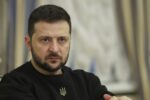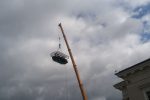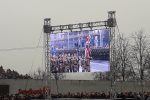You can not find Vällinge settlement in a large map of Sweden. Hardly it would even be in a memory of tourists looking for a remote place. Though a few houses called Vällinge are settled on a bank of a huge lake and surrounded by forests, cliffs and silence. This settlement is best known for soldiers.
Not only soldiers of Sweden army have heard what Vällinge is famous four. This name is known to volunteers of Estonia, Latvia, Lithuania, commanders of Association soldiers of reserve ordinary soldiers of reserve. The matter is that Sweden instructors usually give free lectures to soldiers of voluntary services and soldiers of reserve of three Baltic states.
In this summer almost a week Lithuanian flag was streaming in Vällinge. The working day usually started at 8 a.m. when groups of soldiers of reserve from Sweden, Denmark, Estonia, Latvia and Lithuania drew up in a court-yard beside two ancient guns and the standard-bearers solemnly raised flags of all countries of the participants taking part in lectures. No chase, no drive. If you are mistaken or your opinion differs from the Estonian or Danish, no one will laugh, no one remark. There in Vällinge, we were four Lithuanians – Nerijus Treinys, Vidmantas Augulis, Zygimantas Pupkis and the author of the article.
The lectures, however, were a little bit unusual. We were asked, for example, which features of a commander are the most important and decisive; how we have to act if our commander is drinking hard, taking drugs or have a romance with local muslim girl during the peace keeping operation, or he belongings to a sexual minority. We were inquired how would we behave with captives: whom we would feed first – our soldiers or captives? We were elicited, in what way the enemy should be annihilated: making less damage to a civil citizens or we should not have to pay attention to such „small things”…
One day we were taking physical exercises. We had even to climb over the abyss tied up to a tree with the alpinist ropes. However, all these exercises on the bank of the lake were aimed at developing feeling of collectivity rather than improving our endurance. It was impossible to carry out alone almost no one of exercises. Only all together by supporting each other we were able to stand on a very small raft for a few seconds, to climb almost to a top of pines by hanging logs, from one draft to reach another without touching the ground.
We usually returned to Vällinge in the evenings, had dinner and then all gathered in the officer’s pub, situated in a two storied building. Then the most interesting answer to all questions were pouring. Of course, the usual question we asked our Swedish colleagues was what they think about the future of Russia. And the Swedish always asked the similar: how the Lithuanians, the Latvians and the Estonians imagine future relations with our eastern neighbor. It was pleasant, when the Swedish not only put some Lithuanians words in our conversation but at every occasion stressed that they know about the time when the lands of Lithuanian dukes spread till the Black Sea.
A few remarks of Swedish officers stuck in my memory. For example, they do not think that Russia can again occupy the Baltic states by force. Western countries, according to available data of our northern neighbors, warned Moscow against using a brutal military force. However, they are sure that Russia seeks to change the events towards desirable direction by other means – by intensively looking for the allies in the Baltic countries. When Poland was accepted into NATO alliance, nobody expected that there can be so many supporters of Russia interests in this country. The Swedish do not want to be bad prophets but they suspect that situation in Lithuania is even worse than in Poland. By the way, Sweden also had serious problems of the Russians spies till the collapse of the Soviet Union. During 1970-1980 approximately three of four Russian submarines executing reconnaissance tasks wrecked at the Sweden shore annually. But who knows how many submarines run away escaping the rocks.
Talking about the qualities of their military forces, the Swedish always stressed that they have tremendous reserve: thousands of men served their time in the army. Considering military rank, age and arm, they are intensively attending special training courses for reserve almost annually. „The which have well organized army and specially abundant disciplined reserve is irresistible”. This is the conclusion of Sweden officers of reserve. Nowadays the Swedish are decreasing the number of soldiers in the army (but at the same time increasing it in reserve), as according to the opinion of experts, Russia will not be able to threaten their country at least for ten years.
I can’t keep myself from stressing, that Sweden officers, while communicating with us, treated us as equal all the time and everywhere. Everyone of them: major Magnus G. Ruding, the President of Sweden soldiers of reserve association, major Lars-Erik Roos, charming captain Eva Ekvall, Katarina Almgard, captains Martin Arvidsson, Magnus Harrysson, Markus Kuchler and lieutenants Sten Bergstrand, Lars Sorkka, which whome we had many conversations, communicated with us friendly, cordially, as if we were old fellows.
The last evening, which we spent in the pub, especially stuck in my memory. We all had to sing our national or soldiers songs. By the way, there in Vällinge nobody was ashamed to sing national, patriotic songs. The Swedish and the Danish competed with each other who will sing more soldiers songs and tell in a more attractive way and more comprehensively how, when and in what circumstances those song were created.
On a farewell the Swedish presented souvenirs for all the guests, which would remind Sweden, Vällinge military camp, and asked to convey cordial greetings to colonel Jonas Kliauza, the commander of reserve officers association of Lithuanian army.
In foto: Gintaras Visockas. This article is written by Gintaras Visockas from Vilnius, Lithuania. Gintaras is a journalist, a reserveofficer and was a student at BALTJOLDS 2000 in Sweden.
2011.05.20











